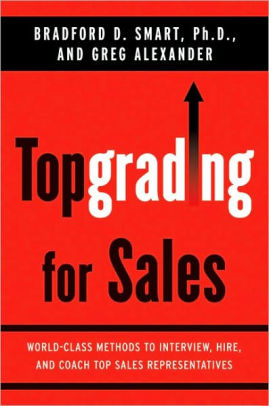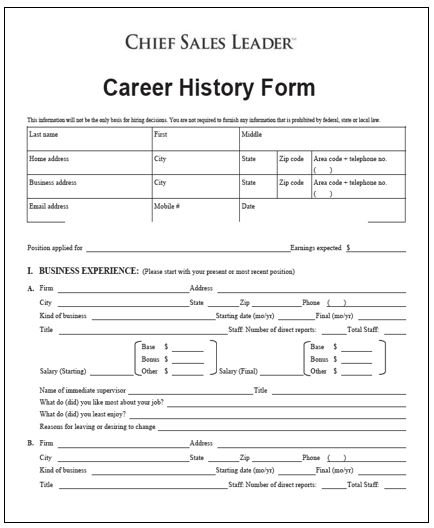What Is The Secret To Hiring Salespeople?
Hiring salespeople that are top performers is difficult, if not impossible. Nearly 60% of new salespeople fail to become top performers. So, what is the secret to hiring salespeople? Some suggest having great offerings to sell, top notch compensation and benefit plans and a great work environment are the secret.
It’s true, these will help you attract top performing salespeople. But attracting them and hiring them are two different things.
In their best-selling book “Topgrading For Sales” Bradford Smart and Greg Alexander make it clear that there is no secret. But, there is a process that will increase your odds of hiring salespeople that are top performers. First introduced to Topgrading in 1995, I have witnessed its transformational power in over fifty companies.
Keep reading and you’ll learn “how to” implement Topgrading.
What Is Topgrading?
Topgrading is an evaluative method for hiring the most highly qualified job candidates. In other words, It brings science to the art of hiring salespeople including:
- Writing narrow job descriptions with specific performance measures that are linked to compensation
- Analytically screening job candidates
- Conducting multiple levels of job candidate interviews
- Having candidates schedule reference checks
- Extending job offers that WOW successful job candidates
So, how does Topgrading approach writing job descriptions?
Writing Job Descriptions
Many companies that struggle with hiring salespeople do not have job descriptions. Some copy job descriptions from other companies through online job boards. While others write job descriptions with a long “wish list” of desired responsibilities, skills and requirements. Unfortunately, all three increase the odds of hiring salespeople that are under-performers.
In short, three lessons can be taken from Topgrading. First, hiring salespeople that are top performers requires narrowly defining:
- Job responsibilities and expected results for each
- Behaviors required to do the job and mesh with company culture
- Requirements that salespeople must possess to become top performers i.e. competencies, experience, academic background, etc.
Second, it requires assigning specific performance measures to each job responsibility, behavior and requirement. If you cannot measure it, then it should not be included in the job description.
Third, it requires each performance measure to be tied directly to either a merit pay, commission or bonus compensation formula. If it cannot be tied then it should not be included in the job description.
Finally, hiring salespeople that are top performers requires that we get the fluff out of job descriptions. Top performing salespeople expect to know their exact responsibilities, how they will be measured, and how they will be compensated.
So, how does Topgrading approach screening sales job candidates?
Screening Job Candidates
Many companies that struggle with hiring salespeople that are top performers skip the screening process. Some partially screen job candidates before interviewing them. While others are inconsistent when screening job candidates. Unfortunately, all three make hiring salespeople that are top performers next to impossible.
In comparison, Topgrading places a major emphasis on screening job candidates. Here’s how it works. First, you narrowly define and weight screening criteria. Second, you place the screening criteria into an Online Career History Form (which replaces traditional job applications). Third, you ask all job candidates to complete the Online Career History Form before interviewing them. Fourth, you score each completed Career History Form against your screening criteria in a spreadsheet or database. Fifth, you review and score each job candidates resume, cover letter and social media in the spreadsheet. Finally, you prepare interview questions to clarify missing, incomplete or confusing information in the spreadsheet.
Why Is A Career History Form Such A Powerful Screening Tool?
The Career History Form is the X-factor in hiring salespeople that are top performers. In simple terms, it shifts the burden of the screening process from you to the job candidate. Here’s how it works. First, job candidates are asked to certify their answers are true, accurate and complete. This causes over 50% of job candidates to self-screen out of your hiring process. Why? Because certifying their answers creates a consequence for embellishing on their experience, skills, education because there is a consequence. So, for every ten (100) job applicants, fifty (50) will self-select out when asked to certify their answers.
Job Candidates Are Required To…
Certify that:
- Answers given in this Career History Form are true, accurate and complete to the best of my knowledge.
- Statements I have made on this Form may be investigated by the employer, if necessary for reaching an employment decision.
Agree that:
- Scheduling reference calls with managers I’ve worked for will be my responsibility if requested to do so by the employer.
- Any false or misleading information provided in my Career History Form or interview(s) may result in discharge and/or legal action, in the event I am hired.
- Abiding by all rules and regulations of the employer is my responsibility.
Second, job candidates are informed that it will take 60 to 90-minutes to complete the Career History Form. This causes over 50% of the remaining job candidates to self-screen out. If a candidate doesn’t invest time into your company, why should you invest time into interviewing and/or hiring them? So, of the remaining fifty (50), thirty (30) will self-select out because they don’t want to invest their time.
Third, your line of questioning signals to job candidates exactly what you are looking for in a salesperson. This causes about 25% of the remaining job candidates to self-screen out while completing the Career History Form. In simple terms, answering your questions helps them conclude they are not qualified. So, of the remaining thirty (30), eight (8) will self-select out because they recognize they are not qualified. This will leave roughly twenty-two (22) job candidates to score in your screening spreadsheet.
In summary, using a Career History Form will cause job candidates to self-screen out of the process. This will speed your hiring process and bring you a major step closer to hiring salespeople that are top performers.
So, how does Topgrading approach interviewing sales job candidates?
Interview Job Candidates
Companies that struggle with hiring salespeople that are top performers conduct few interviews, involve few people, and conduct inconsistent questioning. Topgrading is the polar opposite. It uses many interviews, involves many people, and conducts consistent questioning. Here’s how it works.

First, you conduct a Phone Interview by the person who scored the Career History Form. The goal is to drive up the Career History Form score. This is accomplished by asking questions about screening criteria where the candidate scored low.
If the candidate meets a minimum score the peer interview is scheduled. The phone interviewer then prepares a one-page summary. This includes a list of the candidate’s strengths, weaknesses, developmental recommendations, and clarifying questions for the peer interview.

Second, a Peer Interview is conducted by three to five people that will have frequent contact with the candidate. This should include salespeople, customer service, operations and other departments. The goal is to explore culture fit and build buy-in to a candidate. They use a Peer Interview Guide to ensure consistent questioning and scoring.
If the candidate meets a minimum score the manager interview is scheduled. The peer group then prepares a one-page summary. This includes a list of the candidate’s strengths, weaknesses, developmental recommendations, and clarifying questions for the manager interview.

Finally, a Sales Manager Interview is conducted with a second person sitting in to take notes. The goal is to explore selling skills, industry knowledge, work experience, interests,expectations of peers and other departments, and their career aspirations.
If the candidate meets a minimum score, a reference check is scheduled. The sales manager then prepares a one-page summary. This includes a list of the candidate’s strengths, weaknesses, developmental recommendations, and clarifying questions for the reference check.
All three Interview Summary Reports should be consolidated into a Final Interview Summary Report. This should include a summary list of questions to ask during the Reference Check.
In summary, by the time a job candidate has completed all three interviews the probability of hiring them is high. This interview approach will bring you a major step closer to hiring salespeople that are top performers.
So, what role do reference checks play in hiring salespeople that become top performers?
Reference Checks
Many companies that struggle with hiring salespeople that are top performers do not conduct reference checks. Some attempt to conduct reference checks but struggle to connect with references in a timely manner. While others make contact but find it difficult to gather meaningful information. Topgrading shifts the burden of reference checks from you to the job candidate.
Here’s how it works. First, you ask the job candidate for a list of their references. This should include both former managers and character references. Second, you provide the job candidate with a list of dates and times when you are available for a reference check phone call. You then ask the job candidate to contact their references and schedule the reference check phone call. This approach saves you time and forces the job candidate to provide legitimate references. If they cannot schedule a reference check with their references, then the hiring process stops. Third, you use a Reference Check Guide to ensure consistent questioning and scoring. This should include the summary list of questions provided during the interview process.
Fourth, you prepare a Reference Check Summary Report for the hiring manager. This includes a list of the candidate’s strengths, weaknesses, developmental recommendations, and any “red flags”.
It’s also worth noting that you should conduct criminal background checks on all job candidates. You’ll be surprised by what you find.
So, what role do career development plans play in hiring salespeople that become top performers?
Career Development Recommendation
Many companies that struggle with hiring salespeople that are top performers do not provide career development plan recommendations when extending job offers. While others provide career development plan recommendations that are not linked to the candidate’s career objectives.
Topgrading uses the hiring process to gather insight on job candidates career ambitions and provides them with recommendations. Here’s how it works.
First, the Career History Form enables each job candidate to provide insight on their career plans. Second, questions are asked during the Peer Interview. Third, questions are asked during the Sales Manager Interview.
Finally, the answers to these questions are consolidated into a Career Development Recommendation document. This document is used when extending the job offer and during onboarding.
So, what role do job offers play in hiring salespeople that become top performers?
Extending Job Offers
Many companies that struggle with hiring salespeople that are top performers extend job offers by calling the successful candidate. Some send them a legal employment agreement. While others mail job offers. None inspire top performers to join your company.
Topgrading makes a big deal out of extending the job offer. It uses the job offer as an opportunity to “sell” the company and career opportunity to the successful job candidate. Here’s how it works.
First, you craft an offer letter that includes the following attachments:
- Job description with specific responsibilities, measures and compensation
- Employee benefits information
- Career development recommendation
- 90-day Onboarding Plan that includes instructions for the first day and week
- Peer Message from the people that conducted the peer interview
- Manager Message to the successful candidate
- Career path opportunities
- Employment Agreement for them to sign
Second, the sales manager calls the successful candidate to extend the job offer. This personal touch demonstrate the sales managers commitment to the successful candidate. During the call, the sales manager should review the elements of the job offer listed above. The sales manager should also let them know that human resources will be emailing them the offer letter and the detailed attachments listed above. Third, human resources should call the successful candidate to proactively answer any question they might have.
In summary, this personal touch lets the successful candidate know that the sales manager values them. Top performing salespeople expect to work with top performing sales managers!
To learn “how to” improve technical knowledge transfer during onboarding check out How To Expedite Onboarding New Salespeople.
In Conclusion
Hiring salespeople that are top performers is difficult, if not impossible. Topgrading’s evaluative method brings science to the art of hiring salespeople including:
- Writing narrow job descriptions with specific expectations and performance requirements
- Analytically screening job candidates
- Conducting multiple levels of job candidate interviews
- Having candidates schedule reference checks
- Extending job offers that WOW successful job candidates
So, it’s time to use The Topgrading Method to increase the odds of hiring salespeople that are top performers!
Please Take a Minute To:
- Write a comment on this post.
- Click Here to learn more about how to improve a sales team.
- Share this blog with other sales leaders, salespeople, CEO’s and investors.
It’s time to bring precision – – effectiveness, efficiency, and predictability – – to sales execution.







